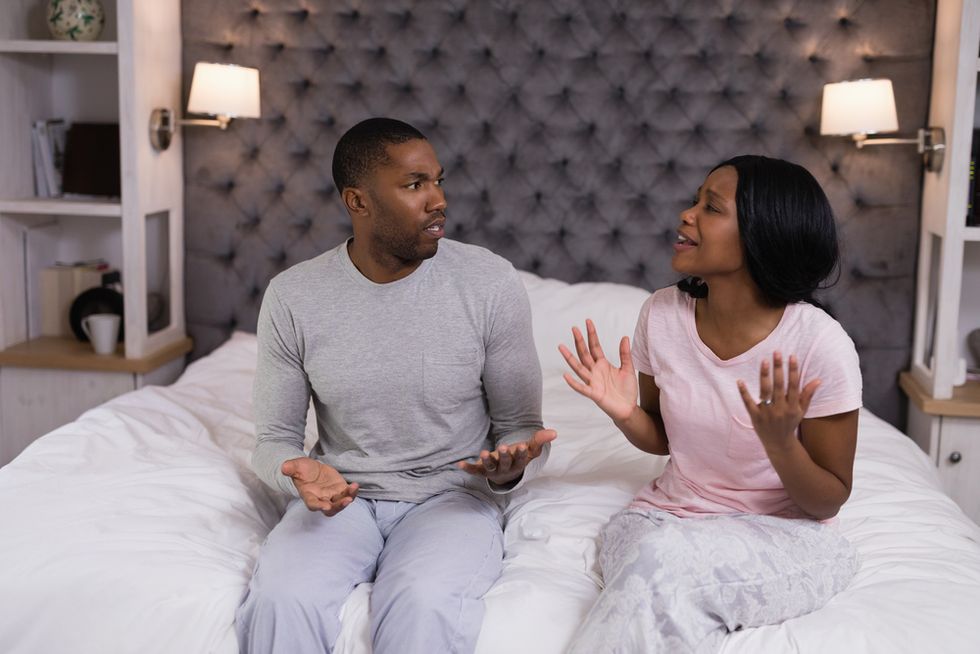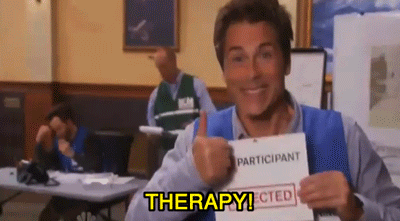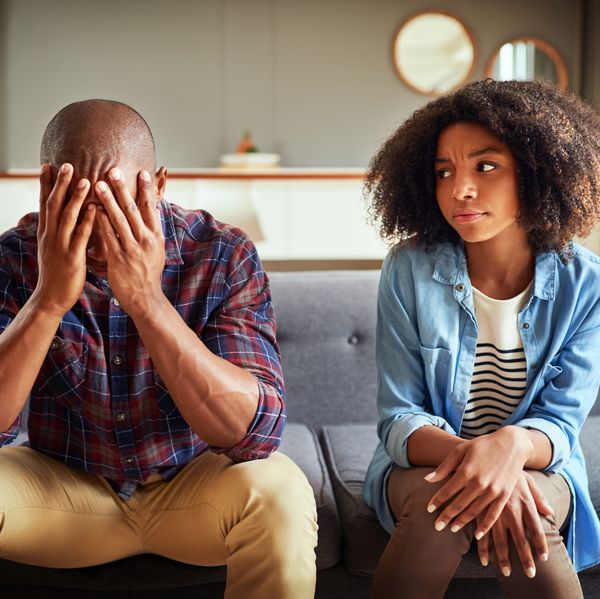
Back when I wrote my first book, I coined a phrase called "sexual misuse". Being that I went through quite a bit of sexual trauma while growing up, I thought it was important to find a way to separate the difference between sexual abuse (what was done to me) and sexual misuse (poor decisions that I made on my own). That phrase came back to my mind a few days ago as I read a term I had personally never heard of before—intimacy anorexia.
Before I get into what that is and how it can both affect and infect a couple's sex life, let me first say that I know quite a few women—including Black women—who have dealt with the eating disorder anorexia (although reportedly, bulimia tends to be more common within our community). I don't want to make light of how that affects so many and so, for the record, I just want to share that one definition of anorexia is "loss of appetite"; what we're going to explore today is how a loss of an appetite for intimacy can ruin sex overall.
With that being said, if you're also not familiar with the phrase intimacy anorexia, let me take a moment to explain signs of this "disorder", along with what you can do to address it if you happen to recognize some of these signs in your own relationship.
How Can You Know If You or Your Partner Has Intimacy Anorexia?

I gotta admit that when I did some research on who came up with this term and read some of the signs that are directly linked to intimacy anorexia, I immediately sent Dr. Douglas Weiss's site to a married couple I know. It's a husband and wife who has basically been in a sexless marriage for close to five years now (to be real, things weren't going all that well even before then). The reason why I thought the site would be helpful is because, two years before an affair (by the husband) transpired, there had still been no sex going on. And although I've shared with the wife that she might want to look into how that played a direct role in the infidelity, she still refuses to see it. To her, withholding sex isn't nearly as "bad" as infidelity. Meanwhile, I'm over here like, even the Bible says, "Do not deprive one another except with consent for a time, that you may give yourselves to fasting and prayer; and come together again so that Satan does not tempt you because of your lack of self-control." (I Corinthians 7:5—NKJV) Withholding sex deprives. Withholding sex tempts. Withholding sex ain't a good look—point, blank and period. A big part of the reason why is found in the word "withhold". Can anything healthy or beneficial be rooted in choosing to refrain from giving or granting sexual intimacy to your partner? Man.
The reason why I was so grateful to Dr. Weiss's breakdown is because it provides quite a bit of insight into how a couple can end up having sex less than 10-15 times a year (which is the textbook definition of what a sexless marriage is). According to him, this is how you know that you or your partner (if not both of you) are suffering from intimacy anorexia:
- You're too busy to make time for your spouse
- You constantly blame them for the problems in your relationship
- You refuse to express love in the way that your partner needs it
- You neglect to praise your partner so that they will feel respected and appreciated by you
- You consciously withhold sex and/or intimacy during sex
- You don't make it a point to spiritually connect with your partner
- You do not express your feelings with your partner
- You constantly criticize your partner
- You use money to either shame or control your partner
- Due to a lack of emotional bonding, you and your partner are basically like roommates
I must say that reviewing this list actually confirms what I once heard and totally believe—what goes on in a couple's bedroom sets the tone for what's happening in the rest of the house.
Because, think about it—if your partner doesn't make time for you, refuses to fluently speak your love language or is always on your back complaining about any and everything, why would you want to be sexual with them? And if they are treating you this way, doesn't it seem like they are sending not-so-cryptic messages that they don't want to be intimate with you either?
Now let me just say this, also for the record. If you just looked at the list of warning signs and thought to yourself, "well damn", don't write yourself off as having this disorder—one that the founder of it actually refers to as an addiction—just yet. For better or for worse, virtually all couples experience at least a couple of these red flags. According to Dr. Weiss, the way to know if it's full-blown intimacy anorexia or not is if you or your partner display five or more of these traits at the same time (you can confirm this by taking the only test here). If you do, that is somewhat of a cause for alarm.
The good news is knowing is half of the battle and there are things that you can do to start healing in this area.
Pinpoint What the Specific Issues Are. Then Discuss Them.

There's another married couple I know who've been together for well over a decade now. The wife says that they pretty much only have sex when she initiates it and, her husband sucks at foreplay. During an impromptu session with them, when I asked the husband what the deal was, he said that his wife's constant yelling and berating totally turns him off. Meanwhile, she said that the selfishness that she felt in the bedroom seemed to be pretty indicative of how he is towards her, period. Do you see what's going on? His ego is bruised and she is resentful. Who's having good sex in that kind of space?
So yeah, if you do recognize that you or your partner are experiencing some of the flags that I shared, it's important to not only acknowledge that with one another, but to try and see where these issues derived from. Then, be open and patient enough to listen to what both of you think can—and should—be done in order to remedy the matters at hand.
See a Therapist/Counselor/Life Coach

I watched T.I. and Tiny's Red Table Talk about their marriage. There is A LOT that I could say; for now, I'll just go with "good for them" when it comes to the fact that they went to counseling in order to save their union.
Personally, I don't think that married couples should wait until they're at the brink of divorce before they see someone. After all, it's one thing to get help when you smell smoke; it's another matter entirely to want someone to save your house when one-half of it is already burned to the ground. Yeah, I definitely believe that counseling should be treated like marital maintenance more than a last-ditch effort.
That said, once you and your partner have realized what the root of your intimacy anorexia is, sometimes that can make things worse, long before they start to become better. A professional can help the two of you navigate how to address your problems and also how to find real and lasting solutions. I know a lot of folks tend to give push back on counseling, but look at it this way—if you could handle things well on your own…they'd be handled. Right?
Work on Restoring Emotional Intimacy Before Revising Your Sex Life

Did you notice how the list of signs that point to intimacy anorexia only mentioned sex once? Things like a lack of a spiritual connection, feeling like you're roommates with your partner and not taking ownership for your own actions have nothing to do with physical intimacy; what they do speak to is how much of a mental and emotional breakdown that there is, though.
If there's a "loss of appetite" for sex itself, spend some time getting back to the basics in the sense of restoring your intimacy via going on dates, being affectionate without being sexual, affirming your partner, being supportive and yes—making them feel loved in the way they need to feel it vs. the way you wish to receive it from them. If you don't know what that way is, ask. A lot of drama can be avoided in a relationship if we'd stop being so busy thinking that we know more about our partner than they know about themselves.
One of the reasons why I'm grateful for insights like this one is, I can't tell you how many couples have tried to convince me that sexless marriages aren't "that bad" or aren't a "big deal". If you are in a long-term committed relationship, you're physically capable of having sex but you're not having it is—it is a big deal. Sexual intimacy is not to be treated as a perk; it should be seen as a necessary staple. Thanks to terms like intimacy anorexia, hopefully more sexless relationships can get to the root cause of their situation so that sexual intimacy can be restored.
If you're just realizing that intimacy anorexia is what you and/or your partner suffer from, it's nothing to be embarrassed about or ashamed of. Now you know more of where your loss of appetite is coming from; now you can start on your journey to getting your groove back. Give thanks. A really good thing just happened—to you and your relationship. It really did.
Want more stories like this? Sign up for our newsletter here and check out the related reads below:
The Signs Of A Truly Intimate Relationship
This Is How To Feel Emotionally Safe In Your Relationship
10 Wonderful Reasons Why Consistent Sex In Marriage Is So Important
10 Things Couples Who (Consistently) Have Great Sex Do
Feature image by Shutterstock
Did you know that xoNecole has a podcast? Subscribe on Apple Podcasts or Spotify to join us for weekly convos over cocktails (without the early morning hangover.)
- Get to Know the Signs of Trauma Bonding - xoNecole: Women's Interest, Love, Wellness, Beauty ›
- Why Writing Love Letters Is A Surefire Way To Revive Your Marriage - xoNecole: Women's Interest, Love, Wellness, Beauty ›
- How To Talk About Intimacy Issues With Your Partner - xoNecole: Women's Interest, Love, Wellness, Beauty ›
- Here's How Trauma May be Affecting Your Sex Life - xoNecole: Lifestyle, Culture, Love, & Wellness ›
- Sex Problems Ruining Sex And Possibly Your Relationship - xoNecole: Lifestyle, Culture, Love, & Wellness ›
- How Do You Manage To Make Time For Sex? Ways To Make Time - xoNecole ›
- Intimacy Anorexia - Characteristics, Treatments & Resources ›
- What's Intimacy Anorexia? ›
- What is Intimacy Anorexia? - The 10 Signs of Intimacy Anorexia and ... ›
- Intimacy Anorexia: Healing the Hidden Addiction in Your Marriage ... ›
- Intimacy Anorexia: The Workbook: Douglas Weiss, Ph.D ... ›
- Intimacy Anorexia - YouTube ›
- 7 Tell-Tale Signs Your Partner Has "Intimacy Anorexia" | Argie ... ›
- Intimacy anorexia - Wikipedia ›
- Doctors say 'intimacy anorexia' may be the leading cause behind ... ›
- What Is Intimacy Anorexia? | Heart to Heart Counseling Center ›
This Is How To Keep 'Holiday Season Stress' From Infecting Your Relationship
Hmph. Maybe it’s just me, but it seems like there is something really weird happening in the fall season air (because winter doesn’t officially begin until December 21) that cuddle season is in full swing while break-up season is as well. In fact, did you know that break-ups are so popular during the holiday season that December 11 is deemed Break-Up Day?
The reasons why relationships shift around this time vary; however, I did both roll my eyes and chuckle when I read that a very popular one is because it’s an easy way to get out of getting one’s significant other a Christmas present. SMDH.
Anyway, I personally think that the less shallow folks out here may contemplate calling things “quits” or they at least distance themselves a bit from their partner (and what I’m referring to is serious relationships) due to all of the stress and strain that oftentimes comes with the holidays whether it be financial, familial, due to their tight schedules or something else.
Listen, I would hate for you and your man to miss the fun and happiness of experiencing this time of year, all because you are so overwhelmed or irritated that you can’t really enjoy it. That’s why I have a few practical tips for how to avoid allowing the typical holiday season stress from INFECTING your relationship.
Manage Your Expectations
 Giphy
GiphyUnmanaged expectations. If there is a main reason why the holiday season tends to be so stress-filled for so many people, I’d bet good money that this is the cause. And when you’re in a long-term relationship, expectations can manifest themselves in all sorts of cryptic and/or unexpected ways. You might have relatives who assume that you are going to be with them for Thanksgiving or Christmas when you have other plans in mind. You might be thinking that you are going to spend one amount for presents while your man is thinking something totally different. When it comes to scheduling, your signals may be crossed.
And you know what? To all of these scenarios, this is where clear and consistent communication come in. Don’t assume anything. Don’t dictate anything either. From now until New Year’s, mutually decide to check in once a week, just to make sure that you are both on the same page as it relates to the holidays and what you both are thinking will come along with it. The less blindsided you both feel, the less stressed out you will be. Trust me on this.
Set (and Keep) a Budget
 Giphy
GiphyOkay, so I read that last year, 36 percent of Americans incurred some type of holiday-related debt. Hmph. Last year, there was still some sense of normalcy in this country, chile, so I can only imagine what finances are gonna look like over the next several weeks. That said, since I don’t know a lot of people who don’t find being broke stressful, make sure that you and your bae set a budget and then stick to it this year — no ifs, ands or buts.
Because really, y’all — it doesn’t make sense to deplete savings and/or max out credit cards for a few days of giggles only to be damn near losing your mind because you don’t know how to make ends meet come Dr. Martin Luther King, Jr. Day.
And by the way, this tip doesn’t just speak to things like food and gifts; I also mean travel. If it doesn’t make a ton of sense (or cents) to be all over the place this year — DON’T BE.
Keep Matthew 5:37 at the Forefront
 Giphy
GiphyIf off the top of your head, you don’t know what Matthew 5:37 says, no worries, here ya go: “But let your ‘Yes’ be ‘Yes,’ and your ‘No,’ ‘No.’ For whatever is more than these is from the evil one.” That verse right there? Oh, it’s a boundaries lifesaver! I say that because do you see “maybe” or “I’ll think about it” in there? Nope. LOL. It says that you should tell people “yes” or “no” and leave it at that — and that complements Anne Lamott’s quote, “’No’ is a complete sentence” impeccably well. Yeah, you’ve got to remember that anything beyond a yes or no to a request is privileged information; you don’t owe anyone details or an explanation.
Besides, if you are really honest with yourself, when someone asks you something and you give a “Umm, let me think about it” kind of reply, more times than not, you already know what your answer is going to be — so why not let you both off of the hook? Give your response. Commit to that. And let everyone (including yourself) get on with their lives and schedules.
I promise you that when it comes to those holiday parties, you are pissing more folks off by not RSVP’ing or doing so and not showing up than just saying, “Thank you but not this year” off the rip.
Remember That Your Personal Space Is Privilege Not a Right
 Giphy
GiphyA friend of mine recently bought a new house and invited me over to come see it. He’s a single man with no children, so as I was taking in all of the space that he had, especially as I walked through his finished basement, I joked about relatives coming to live with him. “Hell no” and “absolutely not” were pretty much his immediate responses as he went on to say that some folks even had the nerve to be offended when he told them that he had no intentions on taking DNA in.
Ain’t it wild how people think that your stuff is their right? And yes, that brings me to my next point. Your home is your sanctuary space. If you want to host folks this year — cool. If not, ALSO COOL. Please don’t let folks (family included) guilt you into how they want you to act or even into what they would do if the shoe was on the other foot. You are not them — and as one of my favorite quotes states, “If two people were exactly alike, one of them would be unnecessary.” (A man by the name Larry Dixon said that.)
Hell, my friends? They know that I am good for sending them random things that they need or even want all throughout the year. Coming over to hang out at my pace, though. Uh-uh. Chalk it up to being a card-carrying member of the ambivert club yet I like keeping my living space personal — and I sleep like a baby, each and every night, for feeling that way.
Always remember that your space, your time, your resources, your energy and shoot, yourself period (including your relationship), are all things that are your own. You get to choose how, when and why you want to share them. The holiday season is certainly no exception.
Cultivate Some “You Two Only” Traditions
 Giphy
GiphyIt’s not uncommon for some couples to hit me up after the holiday season to “detox.” Sometimes it’s due to the financial drama (and sometimes trauma) that they experienced. Sometimes it’s because they allowed their relatives (especially in-laws) to get more into their personal business than they should’ve. More than anything, though, it tends to be because they didn’t get enough quality time together and so ended up feeling “disconnected.”
Please don’t let that happen. Listen, I’m not even a holidays kind of woman and yet, I will absolutely sit myself down with some hot chocolate and chocolate chip cookies to enjoy a Hallmark holiday film or two. Aside from the fact that most of them are lighthearted and sweet, I also like that they usually focus on couples loving on each other amidst all of the holiday beauty and ambiance — which is something that all couples should set aside some time to do.
Maybe it’s a vacation. Maybe it’s a staycation. Or maybe it’s my personal favorite, A SEXCATION. Whether it’s for a few days, the weekend or even overnight — don’t you let the holidays go by without setting aside time for you and your man to celebrate one another. Don’t you dare (check out “Are You Ready To Have Some Very Merry 'Christmas Sex'?”).
GET. SOME. REST.
 Giphy
GiphyI once read that 8 out of 10 people get stressed out over the holidays and 3 out of 10 lose sleep during to it — and when you’re stress-filled and sleep-deprived, that can absolutely lead to hypersensitivity, making mountains out of molehills and even not being in the mood for sex.
Your relationship can’t afford to go through any of this, so definitely make sure to prioritize rest. I don’t care how unrealistic it might seem during this time, sleep should never be seen as a luxury; it will always and forever be a great necessity.
That said, try to get no less than six hours of shut-eye in (check out “6 Fascinating Ways Sex And Sleep Definitely Go Hand In Hand”) and even ask your bae to take a nap with you sometimes (check out “Wanna Have Some Next-Level Sex? Take A Nap, Sis.”). Not only will sleep help to restore your mind, body and spirit but, when it’s with your partner, it’s an act of intimacy that can make you both feel super connected, even in the midst of what might feel like chaos.
___
Holiday season stress is real. Still, never give it the permission or power to throw your relationship off. Put you and your man first and let the holidays be what they are gonna be, chile.
Let’s make things inbox official! Sign up for the xoNecole newsletter for love, wellness, career, and exclusive content delivered straight to your inbox.
Featured image by Shutterstock
Whew. Did you know that somewhere around 122 million Americans travel during the holiday season? Listen, I went to see my godbabies this past September and got caught up in a crazy ass traffic jam at BNA (the Nashville airport) that damn near has me considering air travel ever again — especially during this time of the year.
Besides, it’s not like it’s a written rule that you have to travel over the holidays. In fact, if you want to play it chill this year, why not enjoy a staycation instead? Although it might seem like it’s a “poor man’s compromise,” as you’re about to see, it actually…isn’t.
1. Go All Out with the Christmas Décor
 Giphy
GiphyThere is someone I know who is so obsessed with Christmas, she’s damn near annoying-borderline-terrifying. I’m. Not. Kidding. Yet hey, if you’re going to do a holiday-themed staycation (emphasis on “holiday-themed”), that’s kind of how you’ve got to be. Some décor ideas include:
- A fresh Christmas tree (is the most ideal) that is ultimately decorated
- Wreaths on outside and inside doors
- Garland (with twinkle lights) in predictable and unpredictable places
- Poinsettias
- Mistletoes
- Snow globes
- A stocking (with some of your favorite things in it)
- Fake snow
- Stars
- Angels
- Candy canes
- A BLACK Santa (LOL)
I mean, since you are going to be spending a lot of time at home, it can feel like a mini-winter wonderland if you are intentional about doing more decorating to your living space than you ever have before!
2. Buy a Couple of Christmas-Themed PJs
 Giphy
GiphyWhile I was doing some research on a totally different topic, I happened upon an article that talked about the psychology behind why we should be intentional about what we wear to bed. When you stop to think about the fact that (hopefully) you are sleeping somewhere between 6-8 hours every night, it would make sense that things like the color and fabric of your sleepwear would have a real impact on you — even subconsciously.
Well, when it comes to Christmas décor, specifically, not only does it take you back to nostalgic memories, it can also boost your moods. So, aside from being on-10 with your Christmas décor, also invest in some Christmas-themed PJs. Since you’re going to be doing a lot of lounging around (RIGHT?), do it in something that makes you think about all of your favorite things about this time of year.
3. Cop Some Christmas-Scented Candles
 Giphy
GiphyThere really is no telling how many articles that I’ve written where I am singing the praises of scented soy candles. Candles are soothing, comforting and a very easy way to reduce stress. Also, since it gets darker quicker and for a longer period of time around this time of the year, candles provide a relaxing vibe to your home. Since it is Christmastime, go with scents that are reminiscent of the season:
- Cinnamon
- Vanilla
- Cranberry
- Apple
- Pine
- Frankincense and Myrrh
- Peppermint
- Cashmere
- Ginger(bread)
- Orange
- Sugar Cookies
- Sandalwood
- Cloves
- Cedarwood
- (Hot) Chocolate
Personally, one of my favorite candle companies is Goose Creek. Their signature collections will have your entire house smelling like a high-end bakery. No exaggeration.
4. Play Some Winter-Themed ASMR Sounds
 Giphy
GiphyI’m from Nebraska and my mother was a New Yorker. So, if there is one thing that I like, it’s seasons and that includes snow during wintertime. Unfortunately, Nashville is cray-cray when it comes to that. If, where you live, the weather is all over the place too (which is why I think it’s insane that some people still give pushback to global warming) and you would like for it to at least seem like you are in your own winter wonderland — invest in some fake snow to strategically place around your home.
Oh, and don’t forget to turn on some winter-themed ASMR sounds too. YouTube has videos that run for hours on end that feature blizzards and howling winds that really can make you feel like you are in the midst of an ice storm.
5. Host a Holiday Movie Marathon
 Giphy
GiphyOne thing to remember about a staycation is it doesn’t mean that you have to be alone or that the only people who can participate are the ones who live with you. Since a staycation is simply about staying close to home instead of traveling afar — absolutely consider having some of your favorite people over for a holiday-themed movie marathon. Shoot, Black America Web even did you a solid by publishing “25 Best Black Christmas Movies Of All Time;” plus, Tubi has a Black holiday hits section of indie films too.
Oh, and make sure to get creative with the Christmas-themed snacks. Some ideas? Some Kentucky-fried turkey tenders with cranberry hot sauce (recipe here), some Holiday Hot Spinach Dip (recipe here), some Grinch Kabobs (recipe here), some roasted pecans (recipe here) and some Pomegranate Guacamole (recipe here).
6. Spend a Night (or Two) at a Hotel or Vacation House
 Giphy
GiphyJust like you don’t have to be alone during a staycation, you also don’t have to be cooped up in your house the entire time. Get a change of scenery in your own city by spending the night in a hotel that you’ve always wanted to try out or renting a vacation house for you and some of your folks to hang out in during the time between Christmas and New Year’s Day. I have a “love little sister” who does this randomly when she needs a break from her work as a therapist. She says that it’s damn near like taking a trip (and she has PLENTY of passport stamps; trust me).
7. Have Brunch or Dinner at a Christmas-Themed Restaurant
 Giphy
GiphyIf nothing puts a bigger smile on your face than the thought of DoorDashing meals and barely even touching your stove during your staycation — hey, I am right there with you. Do consider going out to brunch or dinner during your chill time, though. It’s another way to bond with people and create some current holiday memories. And if you’ve got a bae and you opt for dinner, it can be a wonderful type of Christmas-themed date.
8. Go to a Holiday-Themed Concert
 Giphy
GiphyBeing that I got my start as an entertainment writer, hear me when I say that I’m not someone who just has to go to a live concert every chance that I get. Oh, but baby, when I saw that El DeBarge was doing a City Winery tour and he was going to be here right before Christmas — I booked myself a ticket quick, fast and in a super-duper hurry! Shoot, I didn’t even want to go with someone because I plan to give him and that falsetto voice of his my complete and undivided attention. LOL.
I don’t know what it is about the holiday season that makes live music that much more enjoyable — but if there is a concert that features one of your favorite artists happening right through here, consider that to be a cool way to “tour your city” while cultivating a really awesome memory at the same time.
9. Also, Go Ice Skating
 Giphy
GiphyOne of my fondest memories of time with my father is going ice skating. We actually would do it in the summer (because that is when I would visit him) and, every year, he would get me a new ice skating outfit. Even now, when I watch someone ice skate (even in movies; like in the classic movie Garden State), I will have warm fuzzies.
Anyway, if you’ve never been before, go. If it’s been forever since you have, also go. There is something that is very sweet and so signature Christmas about it. Plus, it’s a top-tier form of exercise.
10. Take a Christmas Lights Tour
 Giphy
GiphyAnother one of my favorite Christmas memories is driving through neighborhoods and looking at the Christmas lights. And just like a Christmas concert can be a form of hometown touring, so can doing this if you decide to choose a couple of areas where you’ve never really been or rarely frequent.
Now are you excited about the thought of experiencing a holiday-themed staycation?
I thought you would be. ENJOY!
Featured image by Shutterstock









